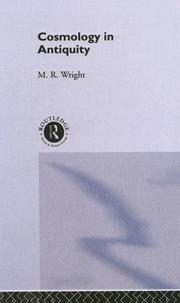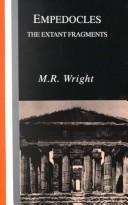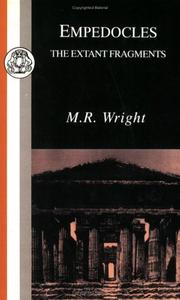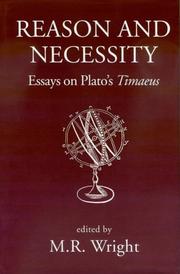| Listing 1 - 8 of 8 |
Sort by
|

ISBN: 0415083729 0415121833 9780415083720 9780415121835 Year: 1995 Volume: *3 Publisher: London Routledge
Abstract | Keywords | Export | Availability | Bookmark
 Loading...
Loading...Choose an application
- Reference Manager
- EndNote
- RefWorks (Direct export to RefWorks)
Philosophy of nature --- Antiquity --- Cosmology, Ancient --- Cosmologie antique --- Cosmologie --- --Antiquité --- --Cosmology, Ancient --- Cosmology, Ancient. --- 113 --- Algemene natuurwetten. Oorsprong van de wereld. Schepping. Kosmogonie --- Philosophy Cosmology --- 113 Algemene natuurwetten. Oorsprong van de wereld. Schepping. Kosmogonie --- Cosmologie de l'Antiquité --- Cosmology [Ancient ] --- Kosmologie van de Oudheid --- Ancient cosmology --- Antiquité

ISBN: 0300024754 9780300024753 Year: 1981 Publisher: New Haven, Conn. Yale University Press
Abstract | Keywords | Export | Availability | Bookmark
 Loading...
Loading...Choose an application
- Reference Manager
- EndNote
- RefWorks (Direct export to RefWorks)

ISBN: 0872202895 0872202909 1853994820 Year: 1995 Publisher: London : Bristol Classical Press,
Abstract | Keywords | Export | Availability | Bookmark
 Loading...
Loading...Choose an application
- Reference Manager
- EndNote
- RefWorks (Direct export to RefWorks)
Philosophy of nature --- Physics --- Philosophie de la nature --- Physique --- Early works to 1800 --- Philosophy --- Ouvrages avant 1800 --- Philosophie --- #A9702W
Book
ISBN: 9781844651832 9781844651825 1844651835 1844651827 Year: 2009 Publisher: Durham : Acumen,
Abstract | Keywords | Export | Availability | Bookmark
 Loading...
Loading...Choose an application
- Reference Manager
- EndNote
- RefWorks (Direct export to RefWorks)
This concise, lively introduction to ancient Greek philosophy will help beginning students of both classical studies and philosophy get their bearings within an important yet complex array of names, schools, and ideas. The book illuminates the key period from the sixth to the third century BC, looking at the ideas that engaged the Greeks, in particular those of the Presocratics, the Sophists, Socrates, Plato, Aristotle, and the earliest Hellenistic philosophers. After chronologically mapping the main figures and their interconnections, Introducing Greek Philosophy focuses on themes especially relevant to philosophy today, including the origins of the universe and its mathematical structures; divine creation versus evolution and natural law; probability theory and the criteria for truth; political debates on democracy, citizen rights, and state obligations; and finally ethics, happiness, and the best way to live.
Book
ISBN: 0856684686 0856684678 Year: 1991 Publisher: Warminster : Aris & Phillips,
Abstract | Keywords | Export | Availability | Bookmark
 Loading...
Loading...Choose an application
- Reference Manager
- EndNote
- RefWorks (Direct export to RefWorks)
Book
ISBN: 1317492463 1317492471 1315711613 1283456753 9786613456755 1844654397 9781844654390 9781317492474 1844651827 1844651835 9781844651825 9781844651832 9781317492467 9781315711614 9781283456753 6613456756 9781317492450 Year: 2009 Publisher: Durham Acumen
Abstract | Keywords | Export | Availability | Bookmark
 Loading...
Loading...Choose an application
- Reference Manager
- EndNote
- RefWorks (Direct export to RefWorks)
This concise and accessible introduction to ancient Greek philosophy is aimed at beginning students of classical studies and philosophy who wish to find their bearings in what can seem a complex maze of names and schools. The book begins by providing a basic mapping of the territory and an introduction to the language and literary form of philosophy in the period. Eschewing the method of most histories of ancient philosophy of addressing one thinker after another through the centuries, the book goes on to examine the great themes that preoccupied the Greeks from the fifth century to the first century BCE and charts how, through argument and counter-argument, philosophical ideas developed, and flourished, in the period. Exploring the ideas of the Presocratics, the sophists, Socrates, Plato, Aristotle and the early Hellenistic philosophers, the book illuminates this formative period in the history of philosophy and shows how many of the themes that engaged the Greeks such as the origins of the universe, divine creation, the search for truth, ethics, material minds and immortal souls, the search for happiness and the best way to live still engage us today. Introducing Greek Philosophy is ideal preparatory reading for students taking courses on ancient philosophy and classical studies and for the non-specialist seeking an authoritative introduction.
Philosophy, Ancient. --- Philosophy. --- Mental philosophy --- Humanities --- Ancient philosophy --- Greek philosophy --- Philosophy, Greek --- Philosophy, Roman --- Roman philosophy

ISBN: 9781853994821 Year: 1998 Publisher: Bristol : Bristol Classical Press,
Abstract | Keywords | Export | Availability | Bookmark
 Loading...
Loading...Choose an application
- Reference Manager
- EndNote
- RefWorks (Direct export to RefWorks)
Empedocles (c. 494-434 B.C.) achieved legendary status as a philosopher, scientist, healer, poet and orator. He made important contributions to the developments of European thought with his theory of the four elements, his detailed work on perception, respiration and cognition, and his understanding in the kinship in structure and form of the hierarchy of living creatures.Now available in paperback, this is the first full-scale edition this century of the extant fragments, which are grouped into two poems -- Physics and Katharmoi. In her Introduction, Professor Wright surveys the evidence for Empedocles' life and writings, and gives a clear account of the main lines of thought within a framework common to the poems. The fragments are presented in their contexts in a new ordering with full critical apparatus; they are followed by a translation and commentary on each, in which the linguistic, philosophical and scientific questions relevant to the text are examined. The Indexes cover sources, passages cited and subject matter, as well as a comprehensive concordance of Empedocles' vocabulary. This new in paperback edition has been updated with a bibliographic commentary covering the last fifteen years of Empedoclean scholarship, and is part of the Classic Latin and Greek texts series.

ISBN: 0715630571 Year: 2000 Publisher: London : Swansea : Duckworth ; Classical Press of Wales,
Abstract | Keywords | Export | Availability | Bookmark
 Loading...
Loading...Choose an application
- Reference Manager
- EndNote
- RefWorks (Direct export to RefWorks)
Philosophy, Ancient --- Cosmology, Ancient --- Mind and body --- Philosophie ancienne --- Cosmologie antique --- Esprit et corps --- Plato.
| Listing 1 - 8 of 8 |
Sort by
|

 Search
Search Feedback
Feedback About UniCat
About UniCat  Help
Help News
News